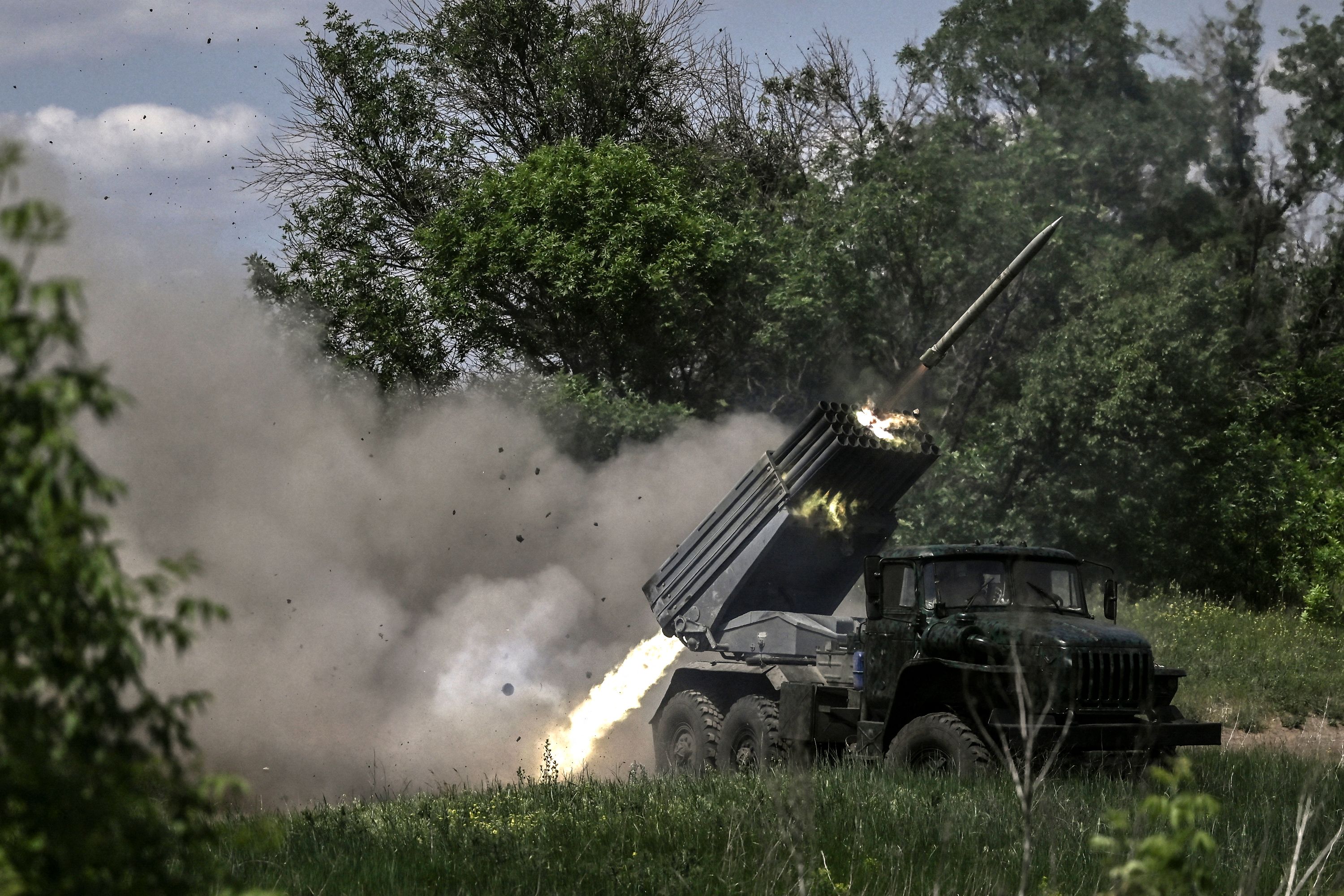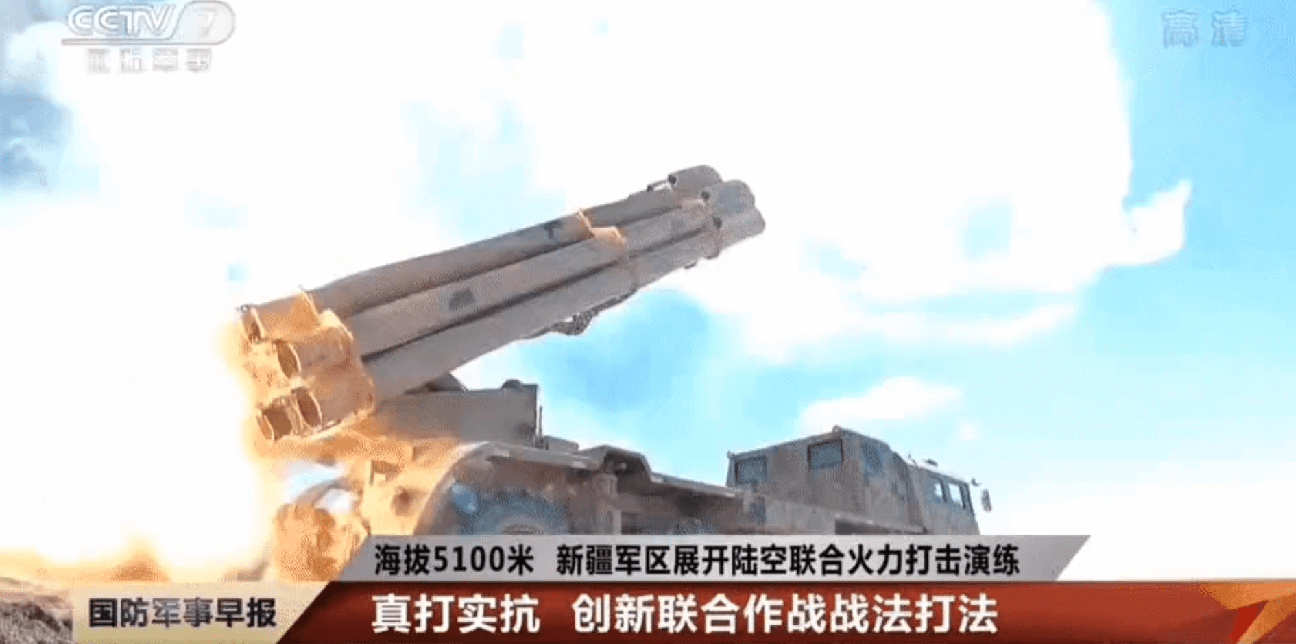beijingwalker
ELITE MEMBER

- Joined
- Nov 4, 2011
- Messages
- 65,187
- Reaction score
- -55
- Country
- Location
China's Version of HIMARS, long-range Multiple Launch Rocket System (MLRS), Could Be 'Game Changer' if Beijing Attacks Taiwan
BY ZOE STROZEWSKI ON 8/5/22 AT 1:33 PM EDTlong-range Multiple Launch Rocket System (MLRS) that has been described as China's version of the HIMARS could be a "game changer" in a potential direct conflict with Taiwan, according to one expert.
Lyle Goldstein, the director of Asia Engagement at the Defense Priorities think tank, shared pictures from the Chinese television channel CCTV-7 on Twitter Friday that he said showed the MLRS being fired in the Taiwan Strait on August 4.
"They might not look as impressive as the missiles shot over Taiwan, but these systems could be the game changer," he wrote, referencing China's ongoing military drills around Taiwan in response to U.S. House Speaker Nancy Pelosi's controversial visit to the islandthis week. "This is economical firepower and implies thousands of strikes per day, ranging the whole island."
A video correspondent with the South China Morning Post, a Hong Kong-based English language newspaper, directly replied to Goldstein's tweet to add that they are the "Chinese version" of HIMARS and part of the Weishi, or "Guardian," family of MLRS.
U.S.-supplied HIMARS, an acronym for M142 High Mobility Artillery Rocket Systems, have become a key part of Ukraine's counteroffensive in the ongoing war with Russia. Ukraine said Friday that just this week, its forces have used the HIMARS to hit more than 10 Russian control points. The comparison with the HIMARS indicates that China's Weishi MLRS could have a major impact if a war were to break out with Taiwan, with experts saying that certain factors would need to be in play in order for this to come to fruition.
When asked whether he agreed that the Chinese MLRS could be its version of HIMARS, Goldstein told Newsweek that he did, saying that he believes the systems are very similar, but it can depend on the accuracy of each.
He believes that HIMARS have been making a "big splash because it's probably more accurate than most of these systems."
"And part of the reason it's so accurate is, I think, the intelligence," Goldstein said. "In other words, all of the thinking that goes into where they want to put it has been excellent."
He added that he believes Chinese weapons would also be supported by a "huge intelligence system" and see success similar to what HIMARS have seen. China's MLRS would probably have "comparable accuracy" to U.S. HIMARS as well, Goldstein added, noting that versions of the Weishi systems are guided.
These MLRS are attractive to China because they're cheap, something that would be important if the nation is seeking a "barrage of firepower."
"If you can lob missiles over that are cheap, then you can launch thousands of them," he said.
Sean Spoonts, editor-in-chief of SOFREP (Special Operations Forces Report), told Newsweek that the Weishi MLRS could be China's version of HIMARS, but with stipulations. In his assessment, the same goes for whether they could truly be a game changer in a conflict between China and Taiwan.
Spoonts said that while the U.S. has several hundred HIMARS, he believes that China only has a brigade strength of the Weishi systems, which is about 20 of them. They could be a game changer if China managed to create 300 or 400 of them and if they had several thousand, or even 10,000, of the rockets for the systems at the ready because each can shoot several at a time, putting China at risk of running out of ammunition quickly.
In terms of accuracy, Spoonts noted that China says the rockets have a satellite uplink navigation system that allows them to receive in-flight telemetry instructions to their targets. If this is the case, a satellite can be jammed and the signal could even be spoofed to send the rockets different instructions, he explained.
Spoonts said that China does have a "pretty good" satellite system, but the question remains on how susceptible it is to being jammed.
There's also a lot of "malfunctioning" among China's systems because they're cheap, Spoonts added. The U.S., in comparison, doesn't "spare any expense" on its own systems.
Therefore, whether China's Weishi MLRS can become its version of HIMARS and a game changer in an attack depends on whether the systems are reliable, if China can invest in creating hundreds of them and if the country carries a rocket inventory in the thousands, he said.

China's Version of HIMARS Could Be 'Game Changer' if Beijing Attacks Taiwan
U.S.-supplied HIMARS have become a key part of Ukraine's counteroffensive in the ongoing war with Russia.














